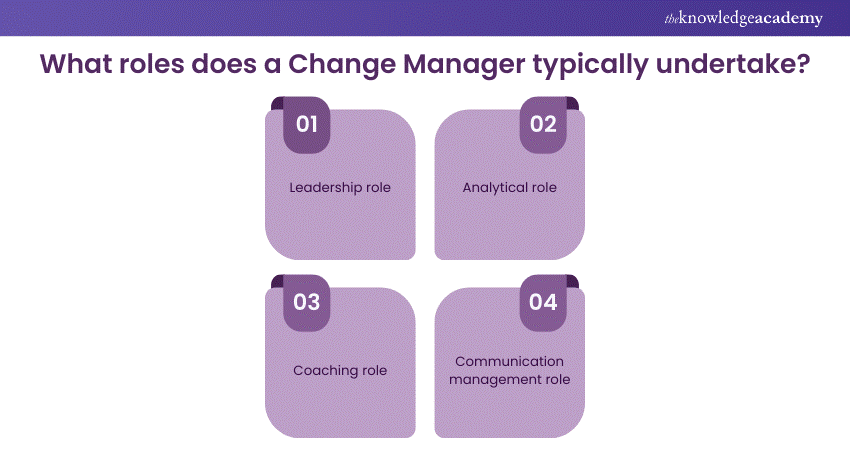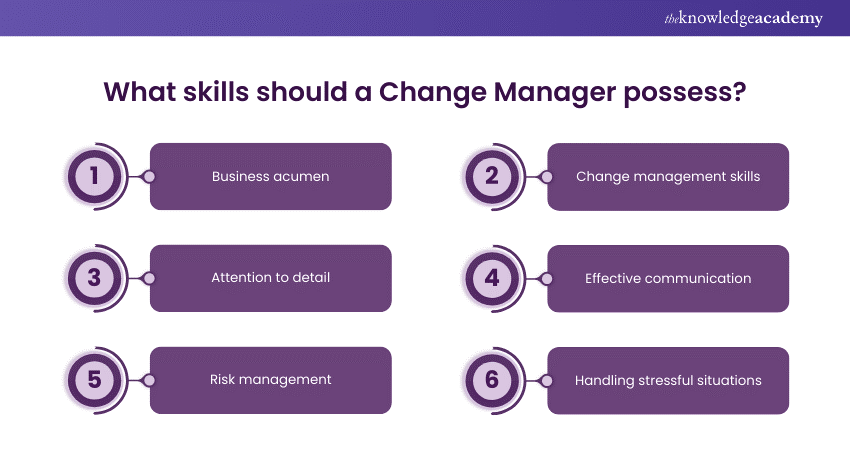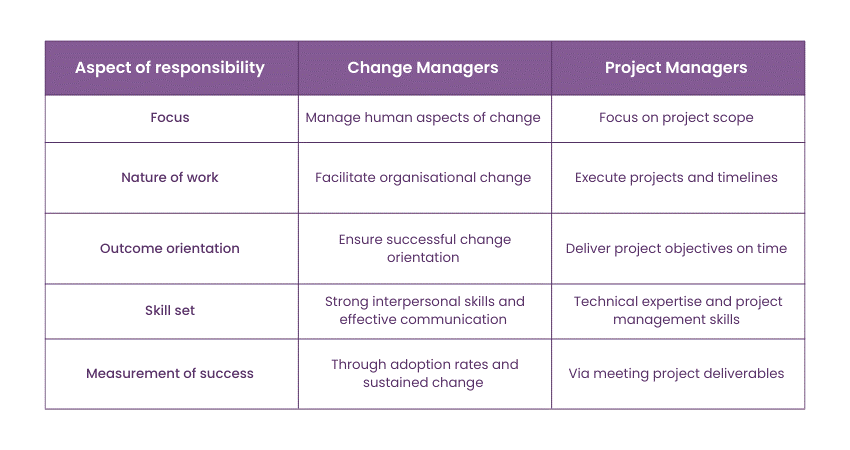We may not have the course you’re looking for. If you enquire or give us a call on +61 272026926 and speak to our training experts, we may still be able to help with your training requirements.
We ensure quality, budget-alignment, and timely delivery by our expert instructors.

At the heart of the ever-evolving business landscape adaptation lies the role of Change Managers. These experts are mostly tasked with orchestrating and navigating organizational transformations. They are essential to guiding businesses through change. Such managers are skilled at handling the human side of transformation as well as the technical parts of change management, reflecting the importance of change management salary in attracting and retaining these skilled professionals.
Change Managers use several skills, often informed by various change management models, to negotiate the complexity of change management. This blog will examine their capacity for strategic vision, analysis, and leadership. Let's dive in to get a detailed overview of their roles and responsibilities.
Table of Contents
1) What is change management?
2) Who is a Change Manager?
3) Roles of a Change Manager
4) Key responsibilities of a Change Manager
5) Skills for Change Managers
6) Change Manager vs. Project Manager
7) Conclusion
What is change management?
Change management is all about a methodical process to handle the human aspect of change within businesses. In order to accomplish desired objectives, it entails planning, implementing, and monitoring changes to systems, processes, or structures. The goal of change management is to facilitate smooth transitions and ensure that change management tools are utilized to achieve desired objectives efficiently.
Who is a Change Manager?
Within an organisation, a Change Manager is in charge of organising and directing change projects. As change agents, they ensure that organisational goals are achieved. Besides these duties, these experts mentor stakeholders through the change process.
Ready to lead and drive success? Enroll in our Change Management Certification program to gain the skills and credentials you need.
Roles of a Change Manager
Strategic vision, competent leadership, and efficient communication are necessary for navigating organisational transformation. Change Managers greatly assist teams as they navigate the intricacies of change efforts. Let's delve into the multifaceted roles of these professionals:

1) Change Manager in a leadership role
Change Managers encourage teams to accept new projects and cultivate an adaptable culture by acting as change agents. They lead with vision, giving stakeholders the courage and inspiration to push for revolutionary change while navigating adversity.
2) Change Manager in an analytical role
Making decisions based on facts is crucial when it comes to change management. Change Managers examine how suggested changes can affect different parts of the company and carefully weigh their advantages and disadvantages. They guarantee that change activities are strategically aligned with corporate objectives by conducting comprehensive studies.
Discover the Best Change Management Books! Read our top picks and transform your organization today!
3) Change Manager in a coaching role
Change Managers act as coaches, guiding individuals and teams through the change process with empathy and support. They provide mentorship, encouragement, and resources. Such contributions help stakeholders navigate challenges, build resilience, and embrace change as an opportunity for growth.
4) Change Manager in a communication management role
Change Managers oversee communication channels, ensuring that stakeholders are informed about changes and engaged throughout the process. They craft clear and compelling messages, foster open dialogue, and address concerns proactively, fostering a culture of transparency and collaboration.
Lead change with confidence – Download the Change Management Guide now!
Key responsibilities of a Change Manager
Change Managers bear important obligations to guarantee the successful execution of change initiatives. Their function involves everything from assessing change requests to settling disputes and directing decision-making. Let's examine some of their principal duties:
1) Navigating Requests for Change (RFCs)
Change Managers serve as gatekeepers for change requests, evaluating each request to assess its impact, feasibility, and alignment with organisational objectives. By prioritising change requests and allocating resources effectively, they ensure that changes are implemented in a timely and strategic manner, driving organisational success.
2) Conflict resolution
Change initiatives often encounter resistance and conflicting viewpoints. Change Managers play a crucial role in resolving conflicts and addressing resistance to change through effective communication and stakeholder engagement. By fostering open dialogue, building consensus, and addressing concerns empathetically, they mitigate resistance and pave the way for smooth change adoption.
3) Chairing the Change Advisory Board (CAB)
The Change Advisory Board (CAB) serves as the governing body responsible for reviewing and approving change requests. Change Managers chair CAB meetings, facilitating discussions among key stakeholders to assess the impact and risks associated with proposed changes. By ensuring that changes are vetted and approved in a coordinated manner, they maintain governance and control over the change process.
Get ready for your interview with our top Change Management Interview Questions.
Skills for Change Managers
To properly negotiate the complexity of organisational change, Change Managers must have a handful of skills. Their skills are crucial for spearheading change projects that are successful, from comprehending company dynamics to skillfully managing risks and interacting with stakeholders. Let's explore the key competencies needed by these managers:

1) Business acumen
A thorough awareness of organisational dynamics, market trends, and business procedures is necessary for Change Managers. With this skill, they can foresee effects on the company, match change activities with strategic goals, and spot improvement areas.
2) Change management skills
Change Managers must be proficient in change management Process approaches, instruments, and procedures. They should be experienced in leading organisations through all phases of change, from preparation and execution to assessment and monitoring. They must limit disruptions and guarantee good results by implementing best practices in change management.
3) Attention to detail
Change initiatives include multiple moving elements and possible hazards. Change Managers, thus, must be extremely detail-oriented in order to spot any problems early on. Through methodical planning and implementation of change projects, they can limit risks and optimise outcomes.
4) Effective communication
Strong communication skills are paramount for Change Managers to convey information, engage stakeholders, and build consensus. They must be adept at articulating the rationale behind change initiatives, addressing concerns, and fostering open dialogue throughout the change process. Effective communication fosters trust, alignment, and collaboration among stakeholders.
5) Risk management
Change initiatives inherently involve risks, ranging from resistance to technical challenges. Change Managers must possess strong risk management skills to assess, mitigate, and monitor risks. By identifying potential obstacles and developing contingency plans, they ensure that change initiatives proceed smoothly and achieve desired outcomes.
6) Handling stressful situations
Navigating organisational change can be inherently stressful, requiring resilience and composure from Change Managers. They must remain calm under pressure, adapt to changing circumstances, and lead teams through uncertainty with confidence. By maintaining a positive outlook and problem-solving mindset, they inspire confidence and instil trust in stakeholders.
Lead your team through seamless transformations with our Managing Change with Agile Methodology Training – join us now!
Change Manager vs. Project Manager
Change Managers and Project Managers play vital roles in organisational initiatives, yet their roles and responsibilities vary significantly. Let's explore their differences in the following points:

a) Focus of responsibility: Change Managers prioritise managing the human aspects of change, including stakeholder engagement, communication, and adoption. But Project Managers primarily focus on managing project scope, schedules, and budgets to ensure timely delivery of project objectives.
b) Nature of work: Change Managers facilitate organisational change by guiding individuals and teams through transitions, addressing resistance, and fostering a culture conducive to change. In contrast, Project Managers look after the execution of specific projects, coordinating resources, tasks, and timelines to achieve project goals within defined constraints.
c) Outcome orientation: Change Managers are concerned with the successful adoption and integration of change initiatives into organisational culture. Project Managers, on the other hand, are outcome-oriented, striving to deliver project objectives on time, within budget, and according to specifications.
d) Skill set: Change Managers require strong interpersonal skills and communication abilities to navigate the complexities of human behaviour. On the contrary, Project Managers need technical expertise, project management skills, and proficiency in tools and methodologies to manage project execution efficiently.
e) Measurement of success: Change Managers gauge success based on the degree of stakeholder buy-in, adoption rates, and the organisation's ability to sustain change over time. They also need to measure change management effectively to assess the long-term impact and refine strategies. Meanwhile, project managers measure success by project deliverables that meet quality standards, adhere to schedules and budgets, and achieve predefined objectives.
Dive into the detailed Case Study on Change Management.
Conclusion
In conclusion, Change Managers play a critical role in driving successful change initiatives within organisations. By understanding their roles and responsibilities in change management, and key skills, these experts can effectively lead change efforts and contribute to organisational growth and success in today's rapidly evolving business landscape.
Become a certified transformation leader with our Change Management Practitioner Training – join us now!
Frequently Asked Questions
What other jobs can a Change Manager do?

Change Managers possess transferable skills that make them suitable for various roles, such as project manager, organisational development consultant, or business analyst. Their expertise in driving change and managing stakeholders is valuable across industries.
Why become a Change Manager?

Becoming a Change Manager offers the opportunity to drive transformational change, influence organisational strategy, and make a meaningful impact on business outcomes. It combines leadership, strategic thinking, and communication skills, making it a rewarding and fulfilling career choice for those passionate about driving positive change.
What are the other resources and offers provided by The Knowledge Academy?

The Knowledge Academy takes global learning to new heights, offering over 3,000 online courses across 490+ locations in 190+ countries. This expansive reach ensures accessibility and convenience for learners worldwide.
Alongside our diverse Online Course Catalogue, encompassing 19 major categories, we go the extra mile by providing a plethora of free educational Online Resources like News updates, Blogs, videos, webinars, and interview questions. Tailoring learning experiences further, professionals can maximise value with customisable Course Bundles of TKA.
What is the Knowledge Pass, and how does it work?

The Knowledge Academy’s Knowledge Pass, a prepaid voucher, adds another layer of flexibility, allowing course bookings over a 12-month period. Join us on a journey where education knows no bounds.
What are related courses and blogs provided by The Knowledge Academy?

The Knowledge Academy offers various Change Management Courses, including Change Management Practitioner Training, Change Management Foundation Training, and Risk Management for Change Training. These courses cater to different skill levels, providing comprehensive insights into Digital Project Management.
Our Project Management Blogs cover a range of topics related to Change Management, offering valuable resources, best practices, and industry insights. Whether you are a beginner or looking to advance your Project Management skills, The Knowledge Academy's diverse courses and informative blogs have got you covered.
Upcoming Project Management Resources Batches & Dates
Date
 Managing Change with Agile Methodology Training
Managing Change with Agile Methodology Training
Fri 2nd May 2025
Fri 27th Jun 2025
Fri 29th Aug 2025
Fri 3rd Oct 2025
Fri 5th Dec 2025
Fri 16th Jan 2026
Fri 13th Mar 2026
Fri 8th May 2026
Fri 10th Jul 2026
Fri 13th Nov 2026






 Top Rated Course
Top Rated Course



 If you wish to make any changes to your course, please
If you wish to make any changes to your course, please


